Understanding the Scope of Geriatric Mental Health Professions
As the population ages, specialized mental health services tailored to older adults become increasingly essential. Geriatric psychiatry and psychology are two critical fields dedicated to addressing the unique mental health needs of this demographic. While both aim to improve psychological well-being, they differ significantly in their approaches, qualifications, and scope of practice. This article explores the fundamental differences between geriatric psychiatry and psychology, examining their roles, educational paths, treatment methods, diagnoses, legal responsibilities, and how they collaborate to serve the elderly with mental health concerns.
Defining Geriatric Psychiatry and Psychology
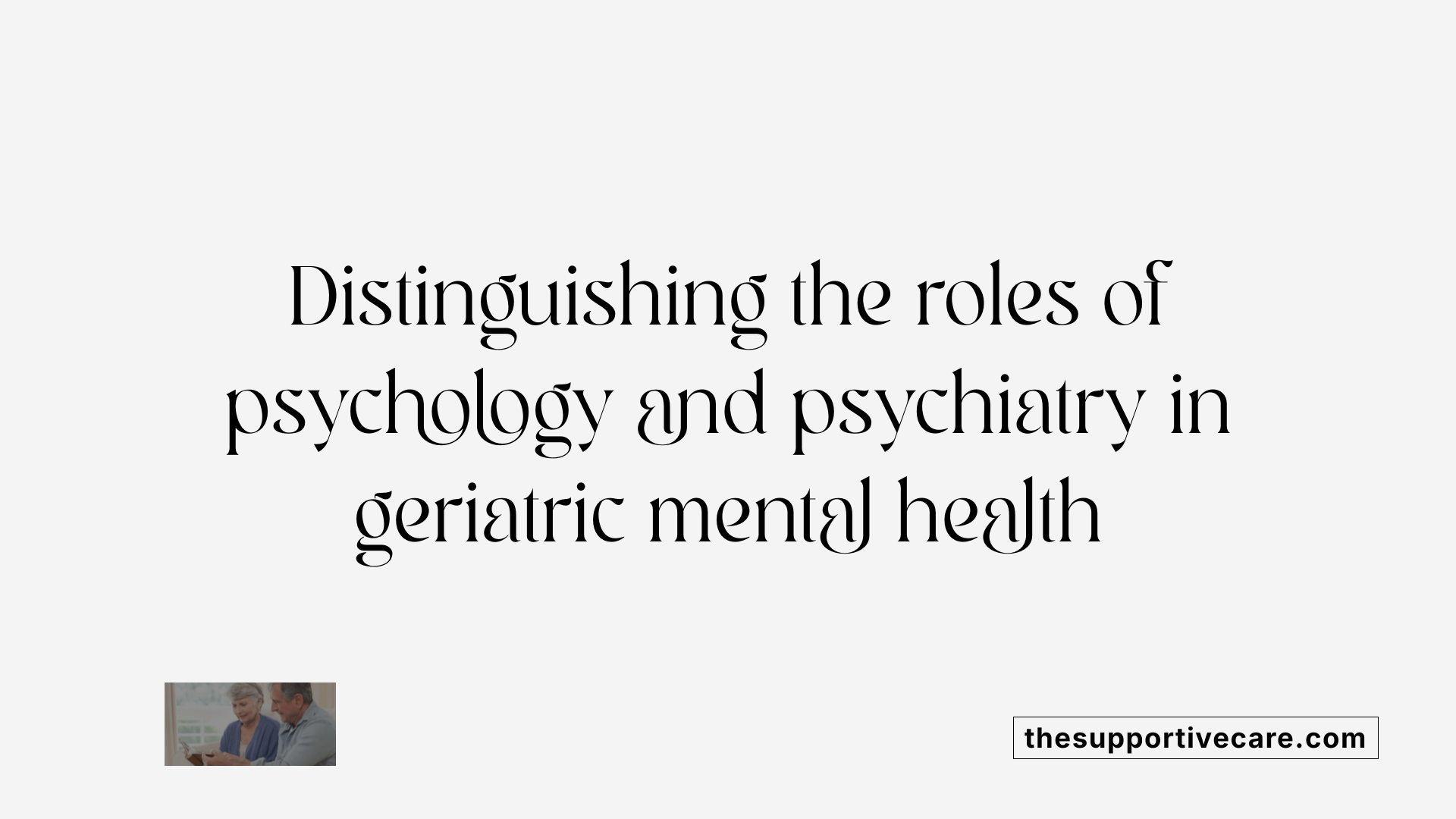
What are the fundamental differences between geriatric psychology and psychiatry?
Geriatric psychology and geriatric psychiatry are two specialized fields focusing on mental health care for older adults, but they approach treatment from different perspectives. Geriatric psychology is a branch of psychology dedicated to understanding and addressing the emotional, behavioral, and cognitive aspects of aging. Professionals in this field, called psychologists, primarily use psychotherapy, behavioral interventions, and psychological assessments to help older individuals cope with issues such as depression, anxiety, memory problems, and adjustment to aging.
In contrast, geriatric psychiatry is a medical specialty involving the diagnosis and treatment of psychiatric disorders in the elderly. Geriatric psychiatrists are medical doctors with an MD or DO degree who have completed residencies in psychiatry, with additional training in aging-related mental health issues. They often incorporate medical assessments, pharmacological therapies, and management of physical health conditions that influence mental health.
While both fields aim to improve mental well-being, their core approaches differ significantly:
| Aspect | Geriatric Psychology | Geriatric Psychiatry |
|---|---|---|
| Education | PhD or PsyD in psychology | MD or DO with residency in psychiatry |
| Focus | Psychological, behavioral, and cognitive aspects of aging | Biological, medical aspects including medication management |
| Treatment methods | Psychotherapy, behavioral interventions, psychological assessments | Medical assessments, medications, combined medical and therapeutic interventions |
| Common conditions treated | Mood disorders, anxiety, cognitive decline, adjustment issues | Severe depression, psychosis, bipolar disorder, complex comorbidities |
| Settings | Clinics, private practices, research institutions | Hospitals, clinics, psychiatric units, nursing homes |
This distinction highlights a fundamental difference: psychology primarily emphasizes understanding and altering emotional and behavioral functioning through psychological means, whereas psychiatry emphasizes biological and medical interventions, including prescribing medications.
Approach to mental health in older adults
Both fields address mental health in aging populations but do so with different strategies.
Geriatric psychologists often focus on holistic, non-medication-based approaches. They assess cognitive and emotional functioning, offer therapy tailored to experiences of aging, and develop coping strategies for age-related changes.
Geriatric psychiatrists, on the other hand, evaluate complex medical and psychiatric histories, sometimes managing multiple medications, treating neurodegenerative diseases, and addressing conditions like depression in the context of physical illnesses.
Both professionals may collaborate to ensure comprehensive care. The choice between psychology and psychiatry depends on the severity of symptoms, presence of medical comorbidities, and patient preferences.
Medical versus psychological focus
The core difference lies in their fundamental focus:
Medical focus (Geriatric Psychiatry): Treats mental health issues with pharmacology, medical interventions, and addressing physiological aspects. Psychiatrists may perform medical tests, diagnose physical contributors to psychiatric symptoms, and manage medications.
Psychological focus (Geriatric Psychology): Uses talk therapy, psychological assessments, and behavioral strategies aimed at modifying thought patterns, emotional responses, and behavioral habits.
Both fields are essential in providing balanced care tailored to the unique needs of older adults, especially considering the high prevalence of medical comorbidities and complex psychiatric conditions in this population.
Educational Requirements and Practice Approaches
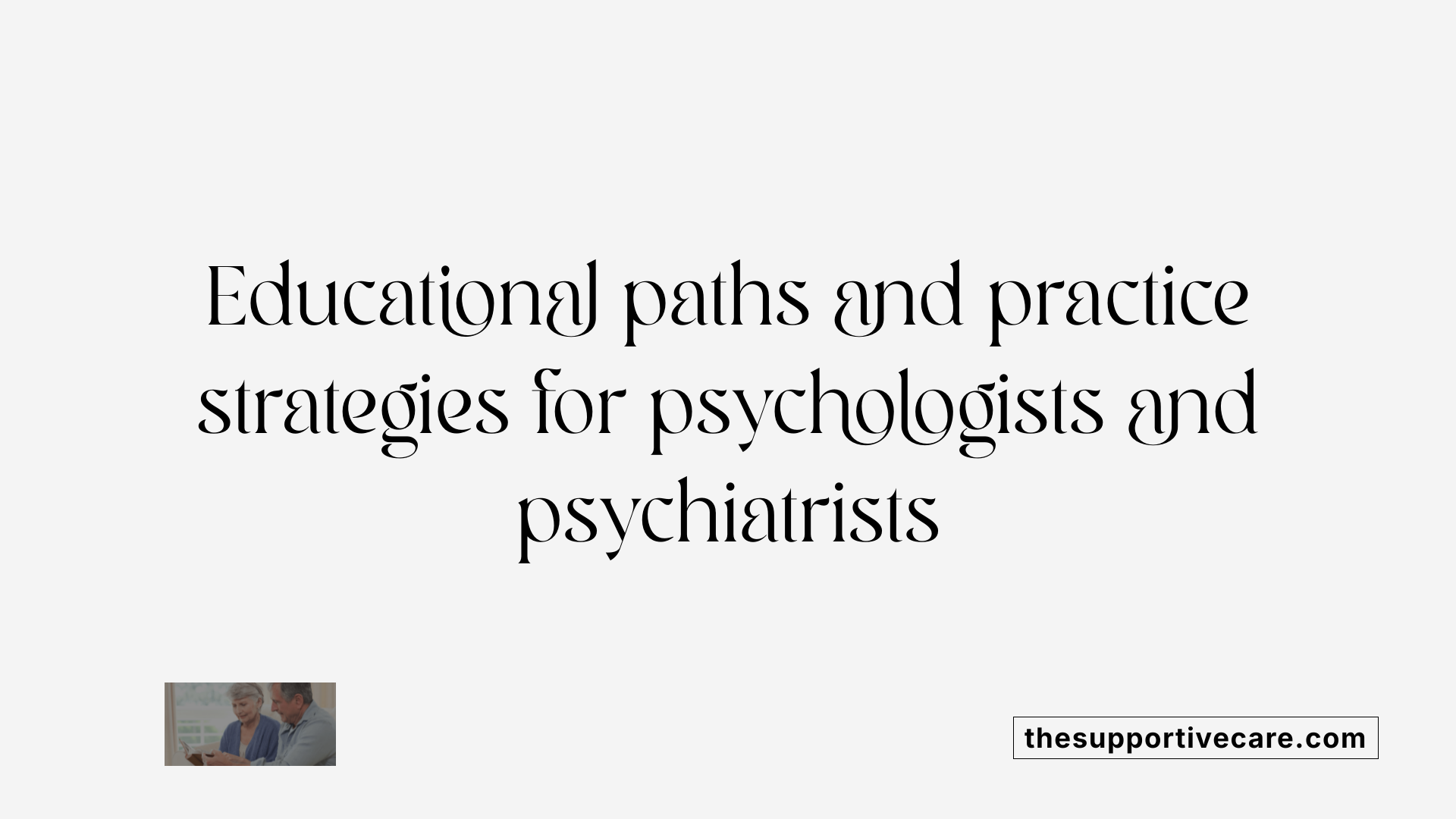
What roles, educational requirements, and practice approaches distinguish psychologists from psychiatrists in geriatric care?
In the realm of geriatric mental health, psychologists and psychiatrists serve distinct roles shaped by their educational paths and treatment philosophies.
Psychologists specializing in geriatric care usually hold doctoral degrees in psychology, either a Ph.D. (Doctor of Philosophy) or Psy.D. (Doctor of Psychology). Achieving this status involves completing extensive coursework in behavioral sciences, conducting research, and acquiring supervised clinical training, often totaling around 5-7 years post-undergraduate. Psychologists are trained to diagnose and treat mental health issues primarily through psychological assessments and evidence-based therapies, such as cognitive-behavioral therapy (CBT). They do not prescribe medications in most jurisdictions but focus on understanding emotional, cognitive, and behavioral factors influencing mental health.
In contrast, psychiatrists are medical doctors (MD or D.O.) with a comprehensive training pathway that includes completing medical school followed by a residency in psychiatry, typically lasting 4 years. Their training encompasses medical diagnosis, pharmacology, and the biological aspects of mental illnesses. Psychiatrists often pursue further specialization in areas like late-life psychiatry, dealing with issues specific to older adults, such as dementia, depression linked to medical comorbidities, and complex psychiatric-medical interactions.
The scope of practice sharply differs between the two. Psychologists rely on psychotherapy and behavioral interventions to address conditions like anxiety, depression, and behavioral challenges. They may use psychological testing to inform diagnosis and guide treatment. Psychiatrists, on the other hand, utilize a combination of biological approaches, including prescribing medications such as antidepressants, antipsychotics, and mood stabilizers, along with providing psychotherapy when appropriate.
In practical terms, geriatric mental health treatment often benefits from collaboration between psychologists and psychiatrists. Psychologists can provide ongoing psychotherapy, behavioral management, and cognitive interventions, while psychiatrists manage complex medication regimens and handle medical aspects of psychiatric disorders.
This multidisciplinary approach ensures comprehensive care tailored to the unique needs of older adults, acknowledging the multifaceted nature of aging-related mental health issues.
| Aspect | Psychologists | Psychiatrists | Additional Details |
|---|---|---|---|
| Educational Path | Doctoral degree (Ph.D. or Psy.D.) | Medical degree (MD or D.O.) | Training duration: 5-7 years for psychologists, 8+ years for psychiatrists |
| Practice Focus | Psychological assessment, talk therapy | Biological, medical treatment, medication | Psychologists excel in behavioral therapies, psychologists do not prescribe in most areas |
| Clinical Skills | Psychotherapy, psychological testing | Diagnosis, pharmacology, medical management | Psychiatrists manage complex medical and psychiatric comorbidities |
| Treatment Approaches | Evidence-based therapies, patient education | Medication management, biological interventions | Collaboration enhances treatment effectiveness |
Understanding these differences helps tailor the most effective, holistic approach for geriatric patients, ensuring both mental and physical health challenges are addressed with appropriate expertise.
Common Mental Health Conditions in Older Adults
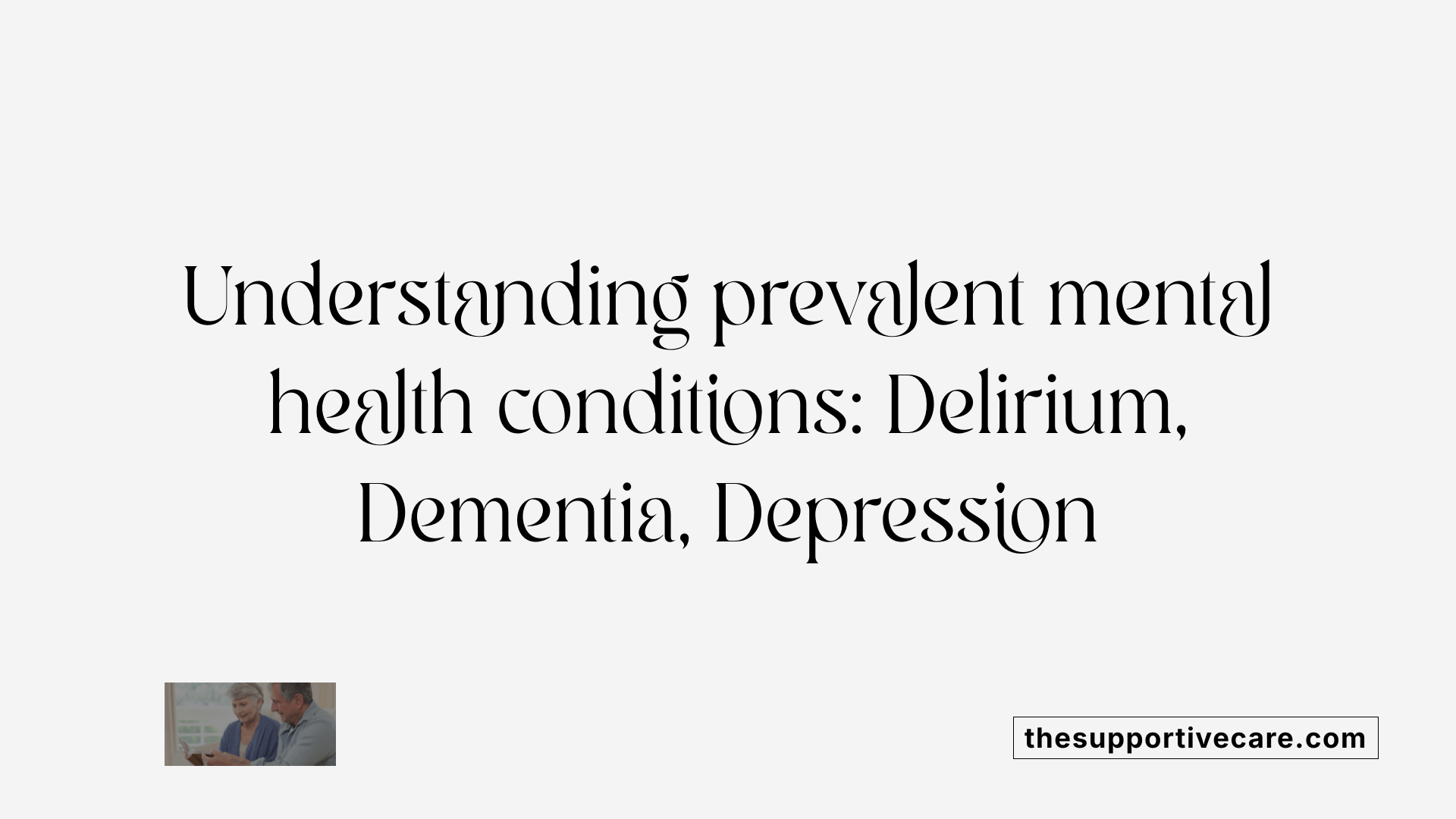
What are the common mental health diagnoses in geriatric psychiatry?
Geriatric psychiatry addresses numerous mental health conditions that are prevalent among older adults. The most common diagnoses include delirium, dementia, and depression.
Delirium is an acute and often reversible state of confusion characterized by sudden changes in attention and cognition. It is frequently triggered by infections, medications, or metabolic imbalances. Delirium is a serious concern because it can lead to increased morbidity and mortality in elderly patients.
Dementia involves a progressive decline in cognitive functions such as memory, reasoning, and problem-solving skills. Conditions like Alzheimer's disease, Lewy body dementia, and other similar disorders fall under this category. Diagnosis is primarily based on clinical evaluations, cognitive testing, and neuroimaging, with the goal of early detection to manage symptoms effectively.
Depression in older adults often manifests as persistent sadness, fatigue, sleep issues, and physical complaints. It can significantly affect quality of life and is associated with increased risk of suicidal ideation. Management typically involves antidepressant medications, psychotherapy, or a combination of both.
These conditions often overlap, making diagnosis and treatment complex. For example, depression and dementia can coexist, complicating clinical decisions. The overlap of symptoms requires careful assessment to distinguish between primary psychiatric disorders and those caused by medical conditions.
Geriatric patients are less likely to exhibit typical symptoms seen in younger populations, which poses unique diagnostic challenges. Healthcare providers rely on comprehensive assessments, including medical history, physical examinations, and laboratory tests, to accurately identify these mental health issues.
How do healthcare professionals approach diagnosis and treatment?
Diagnosing mental health conditions in older adults involves a multidisciplinary approach that considers medical, psychological, and social factors. Clinical interviews, standardized cognitive tests, and detailed medical evaluations help clinicians identify the underlying causes.
Treatment strategies are tailored to address the specific diagnosis, severity, and comorbid medical conditions. For delirium, identifying and treating the precipitating cause is crucial. Dementia management focuses on supporting cognitive functions, behavioral strategies, and caregiver support. Pharmacological treatments, such as cholinesterase inhibitors for Alzheimer's, are often used.
Depression treatment may include medications like antidepressants, along with psychotherapy approaches suitable for older adults, such as cognitive-behavioral therapy (CBT). Non-pharmacological interventions, including social engagement, physical activity, and environmental modifications, also play significant roles.
Special considerations include managing polypharmacy to avoid adverse drug interactions and adjusting treatments to the patient's overall health and functional status.
Who are the specialists involved?
Geriatric psychiatry involves collaboration among psychiatrists specialized in older adult mental health, primary care physicians, neurologists, psychologists, social workers, and nursing staff. Psychiatrists in this field are trained to understand the complex interplay between aging, medical illnesses, and mental health, enabling them to develop comprehensive treatment plans.
Overview of Geriatric Psychiatric Disorders
| Disorder | Typical Symptoms | Common Causes & Challenges | Treatment Approaches |
|---|---|---|---|
| Delirium | Confusion, disorientation, fluctuating awareness | Infections, metabolic disturbances, medication effects | Treat underlying cause, supportive care |
| Dementia | Memory loss, poor judgment, personality changes | Alzheimer's, vascular issues, Lewy body dementia | Cognitive therapies, medications, caregiver support |
| Depression | Sadness, fatigue, sleep disturbances | Medical illnesses, bereavement, social isolation | Antidepressants, psychotherapy, social activities |
Final thoughts
Understanding and effectively managing mental health in older adults requires awareness of the common conditions, their symptoms, challenges in diagnosis, and personalized treatment options. Training in geriatric psychiatry equips clinicians to deal with complex cases, aiming for improved quality of life for elderly patients.
This targeted approach ensures that mental health care adapts to the unique needs of aging populations, emphasizing holistic and multidisciplinary strategies for optimal outcomes.
Diagnosis and Treatment by Professionals
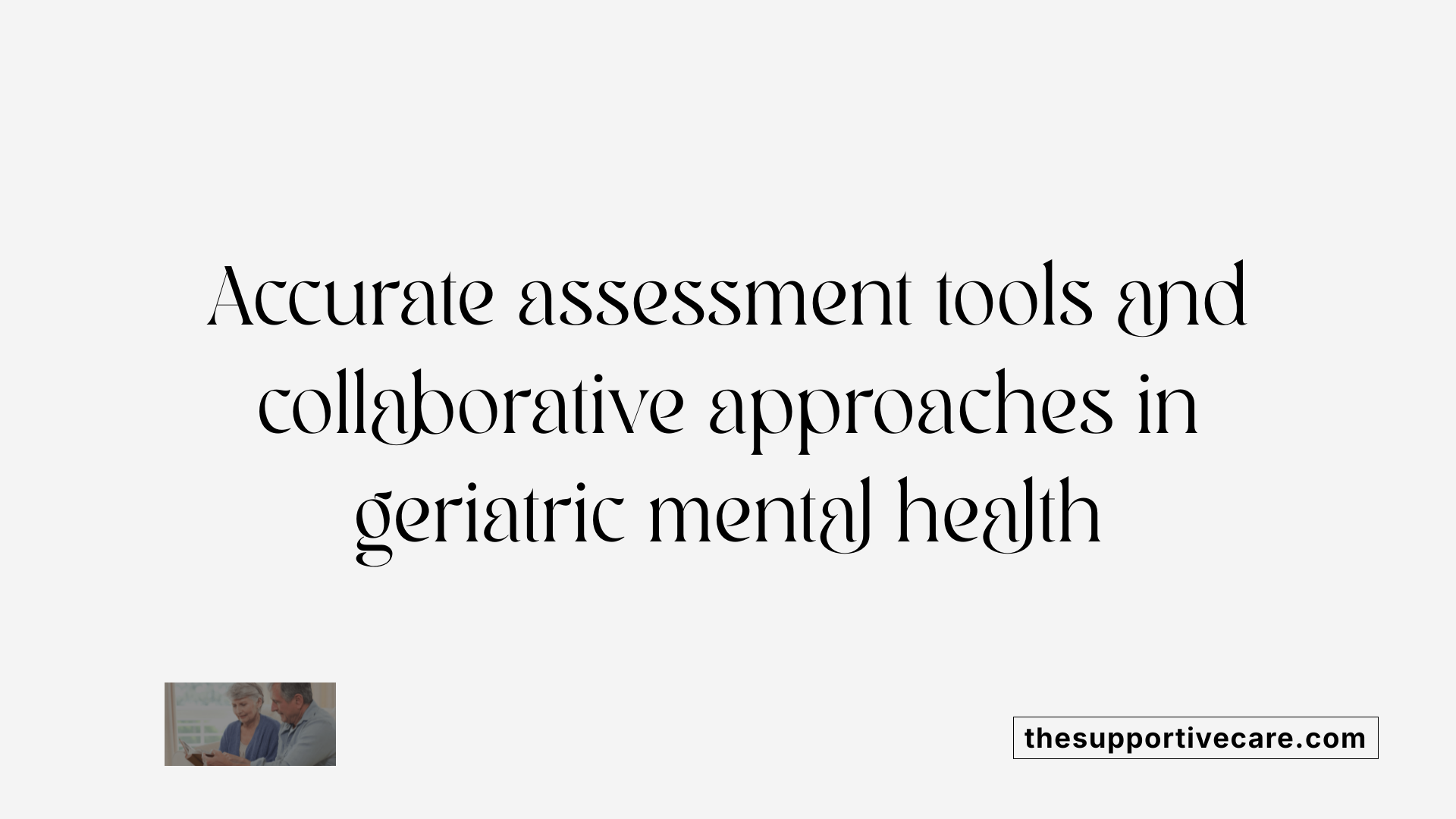
What assessment tools are used by psychologists and psychiatrists?
Psychologists employ a variety of assessment tools to diagnose and understand mental health conditions. These include structured clinical interviews, psychological tests such as the Minnesota Multiphasic Personality Inventory (MMPI), personality assessments, cognitive tests (like the Wechsler Adult Intelligence Scale or neuropsychological tests), and standardized questionnaires. These tools help psychologists gather comprehensive data on a patient's emotional, behavioral, and cognitive functioning.
Psychiatrists, meanwhile, utilize diagnostic manuals like the DSM-5 (Diagnostic and Statistical Manual of Mental Disorders) alongside interviews and medical evaluations. They may also order laboratory tests, neurological imaging, or other medical assessments to rule out physical causes of symptoms or evaluate biological factors.
Both professionals may work together, sharing assessment results to formulate an accurate diagnosis.
What is the scope of diagnosis for psychologists and psychiatrists?
Psychologists are well-qualified to diagnose a broad spectrum of mental health disorders through psychological assessments, clinical interviews, and behavioral observations. They often diagnose conditions like depression, anxiety disorders, bipolar disorder, personality disorders, learning disabilities, and neurocognitive disorders.
Psychiatrists, as medical doctors, can diagnose the same mental health conditions but also focus on severe mental illnesses such as schizophrenia, schizoaffective disorder, and severe mood disorders. Their medical training allows them to evaluate biological factors that may influence mental health, such as neurochemical imbalances or medical conditions affecting the brain.
Both professionals' diagnostic capabilities are essential components in creating effective treatment plans.
What treatment approaches do psychologists and psychiatrists typically use?
Psychologists primarily deliver evidence-based psychotherapies tailored to individual needs. Common approaches include Cognitive Behavioral Therapy (CBT), psychoanalytic therapy, interpersonal therapy, and family therapy. They focus on behavioral change, emotional regulation, and coping skills, addressing issues like anxiety, depression, trauma, and behavioral disorders.
Psychiatrists often combine psychotherapy with medical interventions, especially when dealing with severe mental illnesses. Their treatment approach frequently involves prescribing medications such as antidepressants, mood stabilizers, antipsychotics, or anxiolytics. They also may perform medical procedures like electroconvulsive therapy (ECT) or transcranial magnetic stimulation (TMS) in specific cases.
In many settings, especially in multidisciplinary teams, psychiatrists and psychologists collaborate to provide comprehensive care—medications managed by psychiatrists complement the psychotherapeutic work of psychologists.
Can psychologists diagnose mental health conditions in older adults?
Yes, psychologists are qualified to diagnose mental health conditions in older adults through comprehensive assessments that include clinical interviews, psychological testing, and evaluations of cognitive and personality functioning. They use evidence-based diagnostic tools to identify mental health issues such as depression, anxiety, or substance use disorders, often working as part of inter-professional healthcare teams.
While psychologists can diagnose these conditions, they do not prescribe medication; this responsibility typically falls to psychiatrists or other medical doctors who manage pharmacological treatments. Psychologists also provide psychotherapy and other behavioral interventions to help manage and treat mental health challenges in older adults.
Overall, access to qualified psychologists is essential for accurate diagnosis and effective mental health care in this population.
| Aspect | Psychologists | Psychiatrists | Additional Info |
|---|---|---|---|
| Education | PhD or PsyD in psychology; 5-7 years postgrad | MD or DO; 8-10 years including med school and residency | Psychologists focus on therapy and assessments; |
Psychiatrists on biological treatments | | Prescriptive Authority | Generally no, except in some states with extra training | Yes, in most states, can prescribe medication | | | Treatment Approaches | Evidence-based psychotherapy (CBT, psychoanalysis, etc.) | Medications, medical interventions, therapy | Collaboration often occurs in multidisciplinary teams | | Typical Settings | Private practice, hospitals, clinics, research | Hospitals, private practice, clinics, rehab centers | Geriatric patients in hospital or outpatient settings | | Focus on Conditions | Mild to moderate mental health issues, developmental, educational | Severe mental illnesses, neurochemical imbalances | Treatment tailored to severity and complexity | | Assessment Techniques | Psychological testing, interviews, behavioral assessments | Medical exams, neuroimaging, lab tests | Collaboration enhances diagnosis and treatment | | Geriatric Specifics | Diagnose depression, anxiety, cognitive decline | Treat complex cases, concurrent medical illnesses | Use in aging populations, tailored therapeutic strategies |
This comprehensive approach ensures that patients in need receive accurate diagnosis, effective therapy, and, when necessary, appropriate medical treatment, ultimately improving mental health outcomes across diverse populations.
Treatment Modalities and Collaboration
What are the treatment differences between a psychiatrist and a psychologist for conditions like anxiety or depression?
When treating common mental health conditions such as anxiety and depression, psychiatrists and psychologists each bring distinct approaches based on their training and scope of practice.
Psychiatrists, as medical doctors (MDs), are equipped to prescribe medications including antidepressants, anxiolytics, and mood stabilizers. Their treatment often involves a combination of pharmacological interventions and psychotherapy, especially for more severe or complex cases. They focus on addressing the biological and neurochemical factors underlying mental health issues, using medical assessments, diagnostics, and advanced interventions like electroconvulsive therapy (ECT) or transcranial magnetic stimulation (TMS) when necessary.
Psychologists primarily utilize evidence-based psychotherapies such as cognitive-behavioral therapy (CBT), psychoanalytic therapy, or family therapy, to help clients manage and overcome their symptoms. They conduct psychological assessments, standardized testing, and behavioral interventions to understand the emotional and cognitive factors contributing to the disorder.
Both professionals often work collaboratively to design comprehensive care plans. For instance, a psychologist might handle ongoing therapy sessions for anxiety management, while a psychiatrist monitors medication effectiveness and manages side effects.
The choice between seeing a psychiatrist or psychologist depends on individual needs. Those with mild to moderate symptoms may initially benefit from therapy with a psychologist. Conversely, individuals with severe symptoms or those who may need medication usually see a psychiatrist first, or receive coordinated care from both professionals.
In many cases, the most effective treatment combines both psychotherapy and medication, with the two professionals working together to enhance patient outcomes. This multidisciplinary approach ensures that biological, psychological, and social aspects of mental health are all addressed.
In summary, psychiatrists focus more on the medical and biological underpinnings of mental health disorders, utilizing medications and medical interventions, while psychologists emphasize therapy and behavioral strategies. Collaboration between these specialists maximizes the chances of successful treatment tailored to each person’s condition and preferences.
What are the different types of therapies offered by psychologists?
Psychologists offer a wide array of therapeutic approaches tailored to individual needs, including:
- Cognitive-Behavioral Therapy (CBT): Focuses on changing negative thought patterns and behaviors.
- Psychoanalytic and Psychodynamic Therapies: Explore unconscious processes and past experiences.
- Family and couples therapy: Improve communication and resolve conflicts.
- Dialectical Behavior Therapy (DBT): Used for emotional regulation and self-harming behaviors.
- Mindfulness-Based Therapy: Incorporates mindfulness practices to reduce stress.
- Humanistic and Person-Centered Therapy: Emphasizes personal growth and self-awareness.
- Behavioral Therapy: Targets specific behaviors, often used for phobias or compulsions.
- Neuropsychological Assessments: Diagnose cognitive or neurological issues.
These therapies are evidence-based and can be adapted to treat conditions ranging from depression and anxiety to behavioral disorders and trauma.
What is the role of medication management in psychiatric treatment?
In psychiatric practice, medication management is a crucial component, especially for severe or biological-driven disorders. Psychiatrists evaluate, prescribe, and monitor psychiatric medications such as antidepressants, mood stabilizers, antipsychotics, stimulants, and anxiolytics.
Effective medication management involves initial diagnosis, careful dosage setting, monitoring for side effects, and adjustments over time. Psychiatrists also educate patients about medication use, potential interactions, and the importance of adherence.
Medical interventions, including biological assessments and diagnostics, help tailor medication plans to individual physiological responses. In some cases, medications like antipsychotics or benzodiazepines are used to control acute symptoms or stabilize mood.
How do interprofessional collaborations enhance mental health care?
Collaborative care models combine the expertise of psychiatrists, psychologists, social workers, and other health professionals. This team-based approach ensures that all aspects of a person's mental health are considered.
In practice, psychologists might provide talk therapy, while psychiatrists manage medications, and social workers coordinate social and environmental support. Regular communication among team members fosters unified treatment strategies, improves patient outcomes, and ensures continuity of care.
Such collaboration is particularly beneficial for complex cases, comorbid medical conditions, or when integrating mental health services into primary care settings.
Overall, integrating diverse skills and perspectives leads to more personalized, effective, and holistic treatment plans, ultimately improving recovery rates and quality of life for patients.
Legal and Certification Aspects
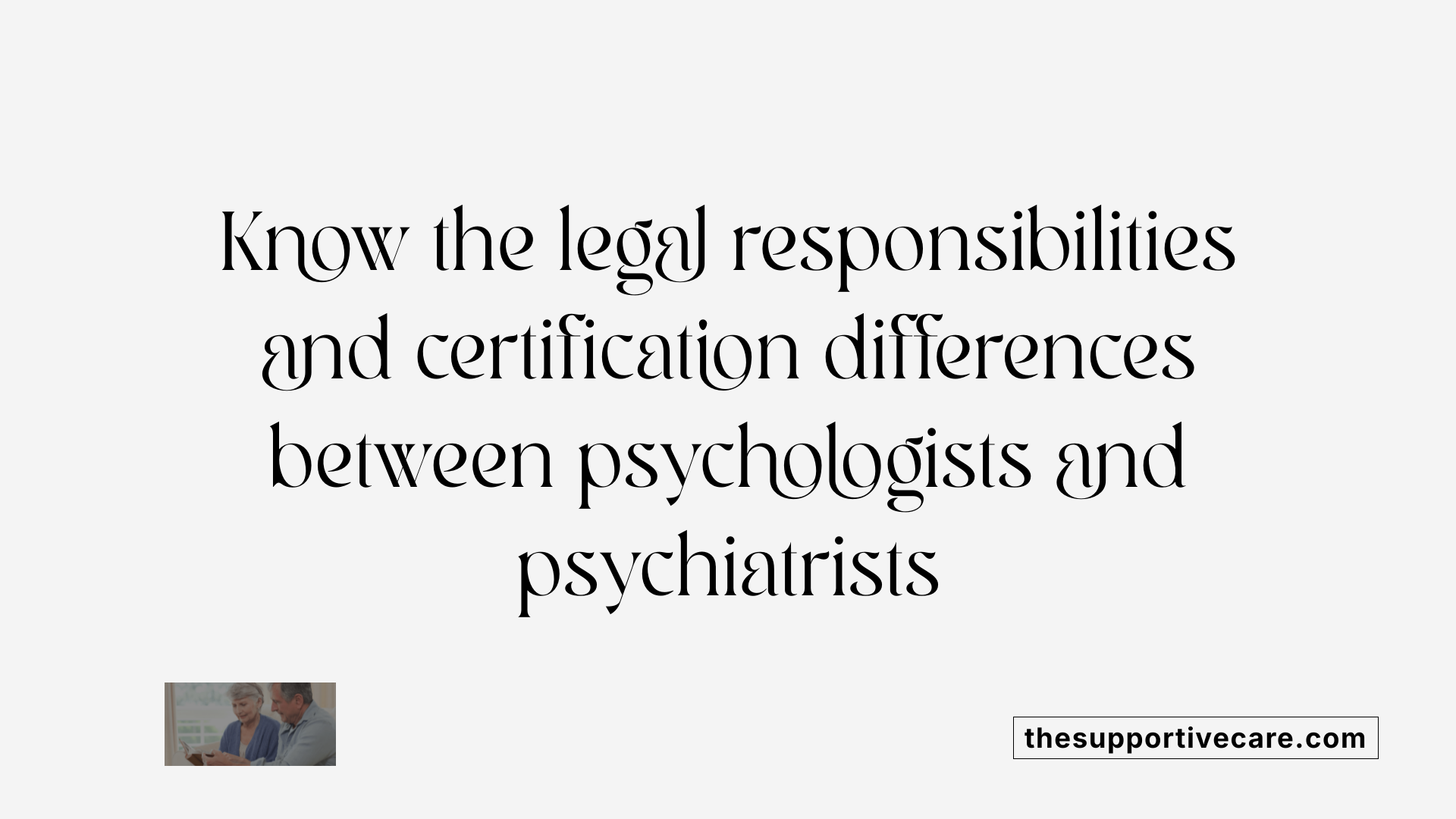
How do the professional qualifications and legal responsibilities differ between geriatric psychologists and psychiatrists?
Geriatric psychiatrists are medical doctors who have completed extensive training in both general medicine and specialized psychiatric care for older adults. They hold an MD or DO degree, and their training includes medical school and a four-year residency in psychiatry. Their legal authority extends beyond assessment to include diagnosing complex mental health conditions, prescribing a wide range of medications, and conducting medical procedures related to mental health. They are also qualified to certify decisional capacity and may testify in legal proceedings concerning elder care. Certification in geriatric psychiatry requires additional fellowship training and board certification, ensuring a high standard of expertise in managing psychiatric and medical co-morbidities common in older populations.
In contrast, geriatric psychologists and counselors typically hold doctoral degrees in psychology (PhD or PsyD) or master’s degrees in counseling or social work. They are licensed to perform psychological assessments, conduct therapy, and develop treatment plans focused on behavioral and emotional well-being. However, in most jurisdictions, psychologists do not have the legal authority to prescribe medications unless specific laws permit trained psychologists to do so. Their responsibilities are primarily centered on mental health evaluation, psychotherapy, and psychosocial interventions, working within a defined scope.
The legal responsibilities of geriatric psychiatrists include managing overall patient treatment plans, coordinating with other healthcare providers, and addressing medical as well as psychiatric aspects of mental illness. They are accountable for medical diagnoses, medication management, and relevant medical procedures. Psychologists and counselors, on the other hand, focus on assessment and treatment through evidence-based psychosocial techniques. They are responsible for ensuring that their services adhere to licensing regulations and ethical standards but do not engage in prescribing medications or conducting medical interventions.
Overall, the broader legal authority allows psychiatrists to facilitate comprehensive medical and psychiatric care, including pharmacological treatment, while psychologists provide specialized psychological services. Certification in geriatric psychiatry reflects extensive expertise necessary to treat the unique needs of older adults, especially those with complex conditions involving both mental health and physical health issues.
This distinction influences their roles within multidisciplinary teams, with psychiatrists often leading medical and medication-related aspects of geriatric care, and psychologists contributing through behavioral therapy, assessments, and psychosocial support.
| Aspect | Geriatric Psychiatrists | Geriatric Psychologists | Additional Details |
|---|---|---|---|
| Qualification | MD or DO with psychiatry residency | PhD or PsyD in psychology | Pathways to licensure differ |
| Prescriptive Authority | Yes, can prescribe medication | No, cannot prescribe | Exceptions exist in some regions |
| Legal Responsibilities | Diagnose, treat, prescribe, testify | Conduct assessments, therapy, develop plans | Focus on medical/psychiatric oversight |
| Certification | Board-certified in geriatric psychiatry | Licensed as psychologist and specialized in geriatrics | Certification reflects expertise |
| Treatment Scope | Biological, medical, psychosocial | Behavioral, psychological, assessment | Complementary roles |
| Settings | Hospitals, clinics, private practice | Clinics, nursing homes, private practice | Work in multidisciplinary teams |
Understanding these differences is crucial for ensuring optimal care for older adults. Selecting a mental health professional depends on the individual's specific needs, especially regarding medication management and comprehensive medical evaluation.
Subfield Focus within Mental Health Professions
What distinguishes geriatric psychology as a subfield within mental health professions?
Geriatric psychology is a specialized branch within mental health services that concentrates exclusively on the psychological and emotional well-being of older adults, typically those aged 65 and above. This subfield recognizes that aging involves complex changes—biological, cognitive, emotional, and social—that can influence mental health.
Practitioners in geriatric psychology focus on understanding how age-related conditions such as depression, anxiety, dementia, and grief impact mental health. They employ assessment tools specifically designed for older populations to accurately diagnose and tailor treatment plans.
A core aspect of geriatric psychology involves adapting therapeutic techniques to suit the unique needs of aging individuals. These treatments often aim to enhance quality of life, maintain or improve cognitive function, foster social engagement, and support independence.
In addition to therapy, geriatric psychologists often work collaboratively with other healthcare providers—such as geriatric psychiatrists, neurologists, primary care physicians, and social workers—to manage complex cases involving medical and mental health comorbidities.
This interdisciplinary approach is vital because older adults frequently face medical issues alongside mental health challenges, requiring integrated treatment plans.
Geriatric psychology also pays special attention to issues such as memory loss, cognitive decline, social isolation, and loss of loved ones. Addressing these requires sensitivity and a deep understanding of the aging process.
Overall, what makes geriatric psychology distinct is its dedicated focus on the mental health needs specific to the aging population, aiming to promote resilience, psychological well-being, and a better quality of life in later years.
Integrating Psychological and Medical Approaches for Elderly Mental Health
Understanding the differences between geriatric psychiatry and psychology is crucial for providing optimal mental health care to older adults. Psychiatry’s medical focus with pharmacological treatments complements psychology’s emphasis on behavioral and psychotherapeutic interventions. Both fields, through their specialized training and approaches, collaborate effectively within multidisciplinary teams to address the complex mental health needs of the elderly. Recognizing the unique roles, educational backgrounds, and legal responsibilities helps guide patients and families toward appropriate care options. As the elderly population continues to grow, advancements in both disciplines will be vital in enhancing quality of life, mental resilience, and overall well-being for older adults.
References
- Differences Between Psychology & Psychiatry
- Psychologist Vs Psychiatrist | UCLA Medical School
- Psychiatry vs. Psychology: Understanding the Differences
- Psychiatrist vs. Psychologist: Which One is Right For You?
- Psychiatry vs Psychology: Key Differences Explained for Better ...
- Blog: Psychiatry vs. Psychology: What's the Difference?
- Psychiatry vs. Psychology: Understanding Differences & Similarities
- What is the Difference Between Psychiatry and Psychology?
- Psychologist vs. Psychiatrist: Some Key Differences - Verywell Mind
- What is a Psychologist vs. Psychiatrist? - Alchemy Wellness


































































































